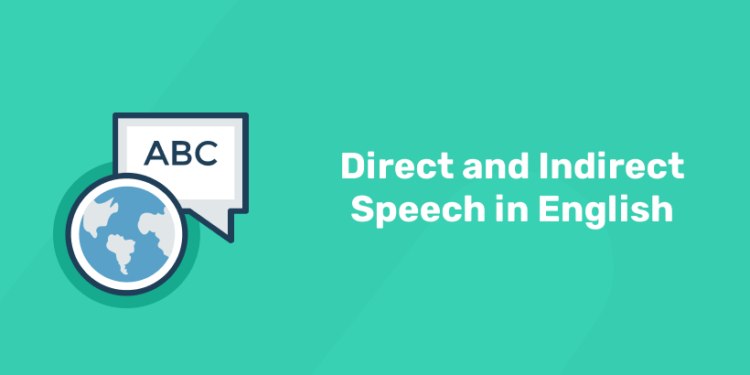Table of Contents
Are you a non-native speaker? Are you interested in learning English quickly?
Are you a person who curiously looks into the nuances of language?
The English language has a universal status. The spoken and written form of the language is needed in our everyday communication. Starting from communication to government exams, English is essential. Here we are learning about language step by step.
What are direct and indirect speech? Do you know the difference between direct and indirect speech? Read the article to know more about direct and indirect speech in English.
During written and verbal communication, direct and indirect speech is a must. When we need to repeat a statement or an action to someone, we should use an appropriate communication method. Direct and indirect speech can help you to communicate freely. The type of speech can be determined based on the type of conversation one engages in. Based on formal or informal communication, you can determine whether the speech shall be direct or indirect.
The study of direct and indirect speech can help you to clear your upcoming government exams too. This is one of the common questions that you encounter each time when you attend a government or bank exam. Make sure you practice with ample examples to score good marks. Alongside, there are many situations where you need to talk about an incident or event that happened which includes many repetitions.
Elevate your speaking skills with our Spoken English Course!
Direct speech
Direct speech is how you can report the message of the speaker in exact words delivered by the speaker.
When you want to describe the words of a speaker, one suitable method is to use direct speech. You can put the phrase between the speech mark in direct speech.
For instance,
Meera said ” I lost my book”
Newspapers and books commonly use direct Speech to communicate ideas.
For instance,
The MP said, ” We plan to renovate the roads recently”
Indirect Speech
1: Which of the sentences below is grammatically correct?
Indirect speech is where you report the message of the speaker in your own words and terms.
For instance,
Deepa said, ” I am busy”.
Deepa said that she was busy.
Learn the distinguishing features of direct and indirect speech and use them correctly in sentences without making any mistakes.
Speak confidently and fluently with our Spoken English Course!
Spoken English Course for Guaranteed Confidence and Career Growth
Spoken English Course by Entri App: Enhance your communication skills, gain certification, and boost your career with confidence.
Join Now!Direct and Indirect Speech – Basic Rules
Here are some basic rules that you ought to bear in your mind while you convert direct speech into indirect speech. If you learn the rules properly, you can use them effectively in sentences.
-
Reporting Verb
While converting direct speech into indirect you have to keep in mind an important factor about the reporting verb. If the reporting verb is in the past tense, the present tenses in the sentence should be converted into the corresponding past tense while you convert a direct speech into indirect.
For instance,
Direct speech: He said, ‘I am gloomy now.
Indirect speech: He said that he was gloomy then.
If the words in a sentence are kept in quotes which talk about the universal truth or habitual action, keep in mind that the tense doesn’t change while converting the direct into indirect speech.
For instance,
Direct speech: She said,’ words are wisdom’
Indirect speech: She said that words are wisdom.
If the reporting verb is in the future or present tense, the tenses of the direct speech do not change when you convert it into indirect speech.
For instance,
Direct speech: She says, ‘I am leaving
Indirect speech: She says she is leaving.
-
Present Tense
Here you will get a very clear idea about the conversion which involves the present tense.
Conversion of simple present to simple past
The present tense in direct speech should be converted into a simple past while changing the sentence into indirect speech.
For instance,
Direct speech: she said,” i am not sure”.
Indirect speech: She said that she was not sure.
Conversation of present continuous to past continuous
While you convert a direct speech into indirect which involves present continuous tense, you should be very vigilant to convert the sentence into past continuous tense.
For instance,
Direct speech: He said, ” i am watching TV”
Indirect speech: He said that he was watching TV
Conversion of present perfect into past perfect
While converting the direct speech in present perfect to indirect speech in past perfect, make sure you change the tense without any hesitation.
Direct speech: She said, ” i have been working in UK for the past 10 years”
She said that she had been working in the UK for the past 10 years.
Direct Speech: Minu said,” she has done her work”.
Indirect speech: Minu said that she had done her work.
-
Past tense and Future Tense
Simple past tense should be converted to past perfect while changing direct speech into indirect
For instance,
Direct speech: She said, ” Manu resigned from job”.
Indirect speech: she said that Manu had resigned from their job.
The past continuous form should be changed to past perfect continuous.
For instance,
Direct speech: They said, ” we were talking”
Indirect speech: They said that they had been talking.
Future tense will be changed to present conditional while you change the content from direct speech to indirect.
For instance,
Direct speech: Dev said, “I will be in Delhi tomorrow
Indirect speech: Dev said that he would be in Delhi the next day.
When you convert future continuous to indirect speech, you ought to use conditional continuous.
For instance,
Mintu said, ” i will be arriving tomorrow”
Mintu said that she would be arriving tomorrow.
Join our Spoken English program today and communicate with ease!
-
Conversion of Interrogative Sentences
In direct speech, if a sentence starts with a question, the question word shall be used as the joining clause instead of conjunctions.
For instance,
Direct speech: The girl asked, ” where is my grandmother?”
Indirect speech: The girl enquired where was her grandmother.
The joining clause should be whether or if the direct speech starts with an auxiliary verb or a helping verb.
Direct speech: she said, ” will you come tomorrow?”
Indirect speech: she asked whether I would come to the party.
The reporting verbs could be changed to enquired, asked or demanded in the case of said or said to.
For example,
She said,” what are you planning tonight?
She asked me what I was planning this night.
-
Conversion of Modals
While you convert direct speech into indirect, make sure to change the models. The models should be changed accordingly.
Can in the direct speech becomes could while you change it into indirect speech
May in the direct speech becomes might while you change it into indirect speech.
Must in the direct speech becomes would have to or had to while you change it into indirect speech.
For instance,
Direct Speech: Meera said, ‘She can play football’.
Indirect Speech: Meera said that she could play football.
Direct Speech: Madhu said, ‘I may buy a new vase’.
Indirect Speech: Madhu said that she might buy a new vase.
Direct Speech: Ragu said, ‘I must complete the task assigned to me’.
Indirect Speech: Ragu said that he had to complete the assigned to him.
Would, Should, Might, and Ought to are the models that won’t change during the conversion of the sentence from direct speech to indirect speech.
For example,
Direct Speech: He said, ‘I should do the laundry”
Indirect Speech: He said that he should do the laundry.
-
Conversion of Pronoun
According to the nature of the subject of the speech, the changes happen to the first person in the direct speech
Direct speech: He said, ” i am in a hurry”
Indirect speech: He says that he was in a hurry.
As per the number of objects in the reporting speech, the direct speech can use the second person.
For instance,
Direct speech: Meera says,” you have fulfilled your duties”
Indirect speech: Meera tells them that they have fulfilled their duties.
The third person of the direct speech won’t change under any circumstances.
For instance,
Direct speech: Ray says, “he sings well”
Ray says that he sings well
-
Request, Wish, Exclamation and Command
The imperative sentences in direct speech transform themselves into infinitive sentences in indirect speech. While you convert direct speech into indirect speech, the verbs like request, order, and suggest advice play along with.
Direct speech: He said to him, ‘please make it fast”
Indirect speech: He requested him to make it fast.
Interjections are removed and the sentence is changed into assertive in the case of exclamatory sentences. Exclamatory sentences express grief, happiness, applause and sorrow.
For instance,
Direct speech: He said,” Oops! I’m sorry.
Indirect sentence: He exclaimed sadly that he was sorry.
Speak confidently and fluently with our Spoken English Course!
Conversion of Direct Speech into Indirect – Primary Rules
While converting direct speech into indirect speech, you need to keep in mind some of the major rules to avoid mistakes. All of the competitive exams demand to answer the question of converting direct speech into indirect. You should be thoroughly aware of the difference between direct and indirect speech along with the basic rules to tackle the conversion.
- Use the reporting verb cautiously
- The first letter of the statement should be capitalized
- Place a comma before the statement
- Based on the tone and the mood of the sentence, place the question marks, exclamations, quotations, full stop carefully
- Capitalize the necessary phrases and sentences
- Learn to remove the conjunctions effectively
- While changing direct speech into indirect, the tenses should be changed accordingly.
- Make sure to change the present tense into the past of the reporting verb while changing the sentence from indirect to direct
- While changing the direct speech to indirect, change the past perfect tense either into present perfect tense or past tense based on the mood of the sentence
Master pronunciation and fluency with our Spoken English classes.
Direct to Indirect Speech – Exercises
Try converting the below-given sentences from direct speech to indirect
- The lady told us that all the girls were playing in the garden.
- Resh said, ‘Alright, yes, you were right and I was wrong.’
- She asked, “When are you leaving?”
- Meera said, “Where do they live?”
- Manager said ‘Why didn’t you attend the meeting yesterday?’
- He said, “Will you have a seat?”
- She requested the interviewer to repeat the question.
- The teacher asked Reshma if he was ready for the race.
- Rahul asked Ruupa, ‘Did you see the cricket match on TV last night?’
- Binu said to Priya, ‘Why don’t you work hard?’
- Mother said, ‘Be quiet and listen to my words.’
- The hostess said, ‘please give me a cup of coffee
- The guide instructed, ‘You shall go to see the royal palace in the moonlit night’
- We said, ‘Let us come in’
- They said, ‘Why are you sketching on the wall?’
- Diya said to Manu, ‘David will leave for his mother’s place tomorrow
- Paneer said that nobody could solve the problem.
Join our Spoken English program today and communicate with ease!
Are you searching for the right resource person to guide you through learning English speaking like a native speaker? The Entri App provides e e-learning techniques for non-native English language solicitors of India. The users will get a chance to attend numerous video classes, study cards and mock tests in vernacular languages. Seize the golden opportunity to learn better.
The methodologies like flashcards, quizzes and tests are used as a perfect learning procedure for the users. By the end of the course, you will be awarded a certificate after the 6 months of spoken English course. The native spoken English trainer Aparna Mulberry and the entire Entri team can help you build a very firm foundation in the language.
The Entri team will make sure that you are ready to face the world. The training sessions will commence with Grammar, Pronunciation, Articulation, Voice Modulation, and Intonation techniques. With daily assignments and practices, the proficiency level can be tremendously increased. Learn with experts to learn better. As English now has a universal status, your knowledge of the language can turn the tables. A native language can train you to equip the language in better terms. Join the Entry team and make your dreams come true.










